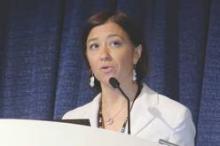CHICAGO – Adding bevacizumab to standard carboplatin and paclitaxel chemotherapy reduced the risk of progression by 41%, compared with chemotherapy alone for patients with advanced or recurrent endometrial cancer in the MITO END-2 study.
Median investigator-assessed progression-free survival was 8.7 months for chemotherapy alone and 13 months for bevacizumab plus chemotherapy (hazard ratio, 0.59; P = .036).
A subgroup analysis of the primary end point showed a significant benefit favoring the bevacizumab (Avastin) arm for patients who were older than 65 years, had an EGOG performance status of 1-2, had recurrent disease, and serous or clear cell histology.
“MITO END-2 is the first randomized trial suggesting efficacy of bevacizumab in advanced or recurrent endometrial cancer. These results merit, in our opinion, further exploration in a randomized phase III trial,” study author Dr. Domenica Lorusso said at the annual meeting of the American Society of Clinical Oncology.
Discussant Dr. Rebecca Kristeleit of University College London said, “I think most promising is that benefits appear greatest in the groups with the greatest need – those older patients, patients with poor prognosis, poor histological subtypes, and recurrence.”
MITO END-2 evenly randomized 108 women with stage III-IV or recurrent type 1 or type 2 endometrial cancer treated with 0-1 previous lines of chemotherapy to receive standard carboplatin and paclitaxel (Taxol) chemotherapy (AUC5) for 6-8 cycles with or without bevacizumab 15 mg/kg. Bevacizumab maintenance was continued until progression or unacceptable toxicity. In all, 5% of patients had prior chemotherapy, about 25% had serous or clear cell histology, and 65% had recurrent disease.
Among 92 evaluable patients, the objective response rate was 54.3% vs. 71.7% (P = .065) and 6-month disease control rate 69% vs. 83% (P = .09), both favoring the experimental arm, Dr. Lorusso of Fondazione IRCCS National Cancer Institute, Milan, said.
Overall survival data are immature with only 34% of required events, but show a similar trend, she said. Median OS was 18 months in patients receiving chemotherapy and 23.5 months in those receiving bevacizumab plus chemotherapy (HR, 0.65; P = .24).
No new safety signals appeared, but particular attention should be paid to cardiovascular toxicity when using bevacizumab in this population, which is typically older and has several comorbidities that are risk factors for cardiovascular disorders, Dr. Lorusso said. In the bevacizumab arm, one myocardial infarction, three arterial thromboses, and three venous thromboses occurred.
Dr. Kristeleit said there has been limited development of new treatments for endometrial cancer and that this must be a time for “catching up.” Advanced endometrial cancer is among the most common gynecologic cancers in the Western world and yet there are no approved molecular targeted agents, no validated predictive biomarkers, and there is a limited understanding of histopathologic selection, despite prognoses known to vary with the different subtypes.
“There’s a lot we need to do to focus our efforts in development of novel treatments for this group of patients,” she said.
On Twitter @pwendl



